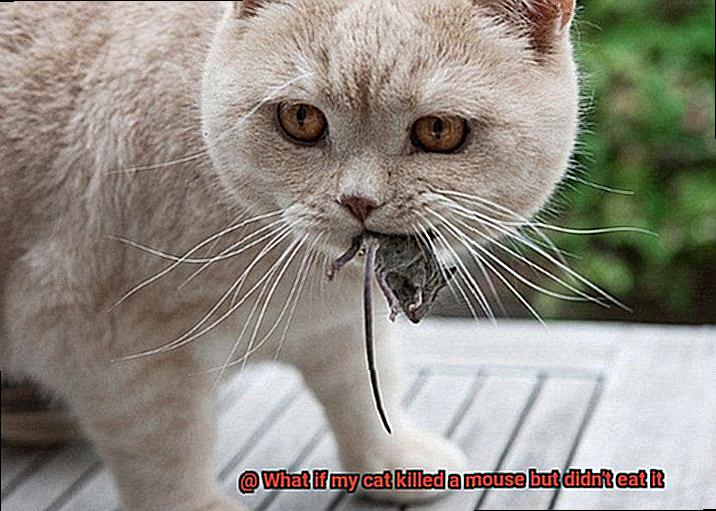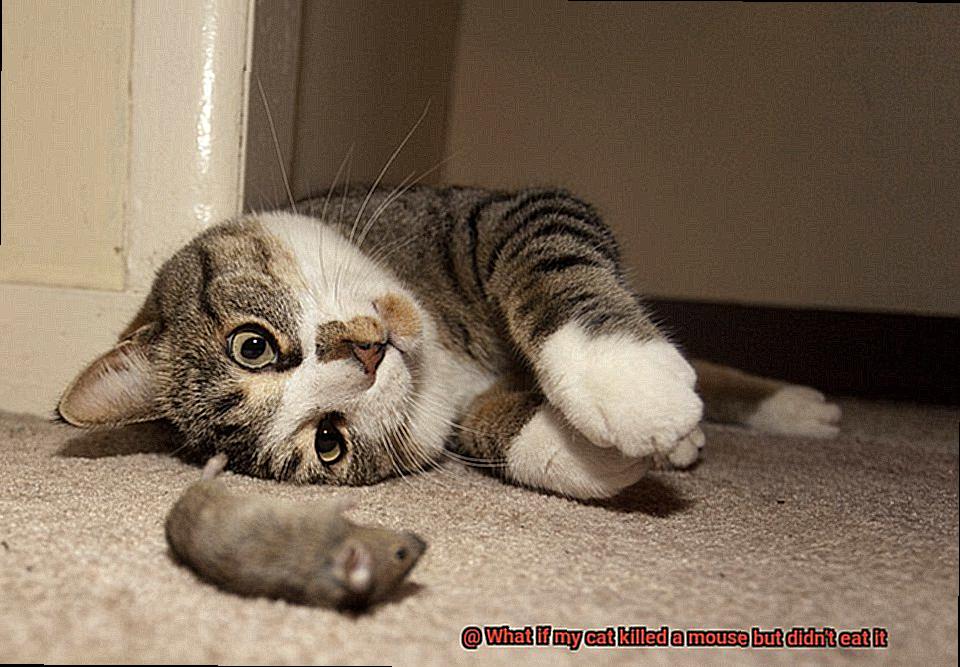As a cat owner, you’re probably no stranger to finding little “gifts” left by your feline friend around the house. From dead mice to small birds, these presents are a testament to your cat’s natural hunting instincts. But what happens when your cat kills a mouse and doesn’t eat it? It can be confusing, and even concerning.
Cats hunt not just for food, but also for pleasure and entertainment. So, if your cat catches prey but isn’t interested in finishing off the meal, there could be many reasons why. Perhaps it wasn’t hungry at the time or found the prey unappetizing. Alternatively, maybe your cat simply lost interest after the thrill of the chase was over. It’s also possible that an underlying health condition is affecting its appetite.
Whatever the reason may be, paying attention to your pet’s behavior and monitoring its health is crucial as a responsible pet owner. In this blog post, we’ll explore why cats might kill but not eat their prey and provide tips on what to do if this happens with your furry companion. So, let’s dive into the fascinating world of feline instincts together.

Why Cats Kill Mice But Don’t Eat Them
You may wonder why cats kill mice but don’t eat them. Well, there are several reasons, and it’s all about their natural instincts.
Firstly, hunting is innate behavior for cats. Even when well-fed, cats still retain the urge to hunt and kill small animals like mice. When they come across prey, they instinctively attack it as part of their predatory nature. This explains why your cat may kill a mouse even when it’s not hungry.
Secondly, your cat may be trying to impress you. Cats are social animals and consider their owners as part of their group. They may bring home the dead mouse as a gift or to seek praise from you.
Thirdly, domestication can cause conflict between a cat’s instinct and lifestyle. In the wild, cats hunt for their food and eat everything they catch. But in domestic settings where food is readily available, cats may kill mice out of instinct but not feel the need to eat them.
Lastly, if your cat has dental problems or gastrointestinal issues, it may find it challenging or uncomfortable to eat the mouse.
Playing with Prey
Although it may appear to be an innocent and instinctual behavior, there are several reasons why it can pose a risk to your cat’s health and your home’s safety.
Playing with prey is a natural behavior for cats, going back to their days as hunters in the wild. It brings them a sense of accomplishment and satisfies their hunting instincts. However, if your cat isn’t eating the prey they catch, it could expose them to various diseases that small animals carry, such as salmonella, hantavirus, and rabies. These diseases can be harmful to your cat’s health and potentially fatal.
Moreover, leaving the prey uneaten can attract other animals or insects into your home, including predators that might harm your cat. This could create an infestation that’s difficult and costly to eliminate.

Fortunately, there are ways to prevent this behavior. Providing your cat with plenty of toys and interactive playtime can help satisfy their hunting instincts, reducing their desire to hunt small animals. Increasing their food intake or feeding them more often can also help reduce their hunger levels.
If these methods don’t work, you might need to take more drastic measures. Keeping your cat indoors or limiting their outdoor time can reduce their access to prey. You could also try using deterrents like motion-activated sprinklers or ultrasonic devices that emit high-pitched sounds when animals come nearby.
Hunting for Sport
Domestic cats still have the primal urge to hunt and kill prey, even when they are not hungry. But why do they do this, you might ask?
In the wild, hunting is crucial for a cat’s survival. It provides them with exercise, mental stimulation, and the opportunity to hone their hunting skills. Even when they are not hungry, a cat may still hunt as a way to maintain these skills and stay sharp.

However, if your indoor cat is killing mice but not eating them, it could indicate boredom or stress. Indoor cats can become restless and agitated when they lack enough stimulation or playtime. They may turn to hunting as a way to relieve their frustration and burn off excess energy.

Moreover, excessive hunting could also be due to stress or anxiety caused by changes in the household or lack of socialization with other animals or people. If you notice any such behavior in your cat, consider seeking help from a veterinarian or animal behaviorist.
While hunting is a natural behavior in cats, it’s essential to take precautions to keep them safe. Mice can carry diseases that can be transmitted to your cat while your cat could also get injured during the hunt. It’s crucial to monitor your cat’s hunting behavior and seek help if you notice any excessive or aggressive behavior.
Access to Other Sources of Food
The answer is simple – it’s in their nature. Cats are natural predators, and their hunting instincts often lead them to hunt and capture small animals like mice, even if they’re not hungry.
Although domesticated cats are often well-fed and have access to various cat food options, they may still choose not to eat a mouse for other reasons. For instance, they might be feeling unwell or not hungry at that particular moment. Nevertheless, it’s crucial to note that if your cat has access to other sources of food, their hunting instincts will still be present. Hence, they may continue to hunt and kill small animals without eating them.
If you’re concerned about your cat’s hunting behavior, there are several approaches you can take to discourage it. One approach is providing interactive toys and games that mimic the hunting experience while keeping your cat engaged. Additionally, you can feed your cat smaller meals multiple times a day, which can help reduce their desire to hunt.
However, keep in mind that hunting is a natural behavior for cats that provides them with exercise and mental stimulation while honing their hunting skills. So if your cat kills a mouse but doesn’t eat it occasionally, there’s no need to worry unless it becomes excessive or aggressive.
Should Pet Owners be Concerned?
While it’s natural for cats to hunt and capture small animals like mice, there are some important things to keep in mind.
First and foremost, it’s crucial to make sure that the mouse has not been poisoned. If so, your cat may become sick from consuming it. In addition, mice can carry diseases and parasites that can be harmful to cats. Fleas, ticks, and tapeworms are just some of the common parasites that can be transmitted to your cat if they come in contact with a dead mouse.
While hunting and eating small prey is natural for cats, consuming too much can lead to an upset stomach or even more serious health problems. Therefore, as a responsible pet owner, it’s essential to monitor your cat’s health and behavior if they frequently catch mice.
Although seeing your cat with a dead mouse may not be the most pleasant sight, it’s generally not a cause for immediate concern. It’s essential to remain vigilant and aware of potential risks, but there’s no need to panic. However, if you notice any signs of illness or discomfort in your cat after they have come into contact with a dead mouse, it’s best to seek veterinary care immediately.
Monitoring Cat Behavior and Hunting Habits
This behavior can be both puzzling and concerning, but fear not – there are several reasons why cats might catch mice but not eat them.
Firstly, cats are natural hunters, and catching prey is an instinctual behavior. Sometimes, cats will catch a mouse and then release it, only to catch it again. This behavior is simply part of their hunting instincts and doesn’t necessarily mean anything is wrong.
Another reason why cats might not eat a mouse is that they may have already eaten recently and aren’t hungry. Cats are known for their ability to regulate their food intake and will often stop eating when they are full. Your cat might catch a mouse out of instinct but lose interest once they realize they don’t need to eat it.
It’s also possible that the cat has caught a sick or diseased mouse and instinctively knows not to eat it. Cats have a keen sense of smell that allows them to detect sickness or disease in prey animals. If your cat catches a sick mouse, they may avoid eating it to avoid getting sick themselves.
If your cat consistently catches mice but doesn’t eat them, it’s crucial to monitor their behavior and hunting habits. This behavior could be indicative of an underlying issue, especially if it’s out of character for your feline friend. It’s worth taking your cat to the vet for a check-up to rule out any health issues.
Additionally, providing plenty of toys and playtime can help satisfy your cat’s hunting instincts without resorting to catching live prey. Interactive toys like feather wands and puzzle feeders can keep your cat mentally stimulated while satisfying their natural predatory drive.
I5Zw49Nwi0w” >
Conclusion
To sum up, it’s not unusual for felines to catch prey without devouring it. Hunting is an innate behavior that cats engage in for fun and entertainment. However, if your cat consistently catches mice but doesn’t eat them, there may be an underlying health issue or boredom and stress. As a responsible pet owner, it’s crucial to monitor your cat’s hunting habits and behavior. Interactive toys and playtime can help satisfy their hunting instincts without resorting to catching live prey.
It’s worth noting that playing with prey can pose a threat to your cat’s well-being. Mice carry diseases that can infect your cat, while leaving the prey uneaten can attract other animals or insects into your home. Therefore, you should take measures like keeping your cat indoors or limiting their outdoor time to reduce their exposure.
To understand why cats kill mice but don’t eat them requires paying attention to their natural instincts, behavior, and health. While hunting is a natural activity that provides exercise and mental stimulation while honing their skills, it’s essential to take precautions to keep them safe.







